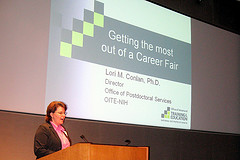
flickr.com/runneralan
The perfect career doesn’t simply happen. Finding a great job requires skill, takes time, and calls for regular career planning sessions.
Career planning isn’t something that you perform once when you graduate high school. It’s an activity that should be conducted on a regular basis. The average person will change careers many times over his or her lifetime, so it’s important to plan ahead and be prepared for the moment your golden opportunity arises. It’s never too early or too late to start your personal career planning.
Many persons shy away from career planning, expecting it to be a tedious exercise. Career planning, on the contrary, is an activity that can boost your confidence and leave you feeling liberated and fulfilled while it broadens your horizons. Setting goals is vital to everyone, regardless of where you may be situated along your career path. These goals can be attainable levels to meet in your present career, or may involve plans to begin a transition along a fresh new life path. In general, career planning should be a positive, rewarding experience.
It is important to set goals, and plan a clear path to achieving them:
1. Annual Career Checkup
Make it a point of assessing your career on a yearly basis. Pick a day or a weekend, and schedule a retreat for yourself. Try to block out all distractions to enable you to really concentrate on the task at hand. Determine what you really want to attain from your career, and where you want your life to take you, and then decide whether your current path is leading you in the right direction. It may be easiest to schedule your personal career checkup to coincide with your yearly job assessment. You can then consider your supervisor’s negative concerns and positive comments, and use them to help balance your own beliefs. When you make career planning a yearly event, you can measure the steps you’ve taken over the past year, and finish the project feeling more secure in your choices. Overall, you will be better prepared for the changes, uncertainties or difficulties that you may encounter in your workplace or industry.
2. Chart Your Course
Any time you embark on a career planning session, one of your first tasks should be to map out any changes that have crossed your job path since your last personal career assessment. While you should try not to dwell on the past, it is crucial to consider any mistakes you have made and reflect on your accomplishments. Being in touch with the previous year will help you to start anew with a clearer image of the year to come. Once you have mapped your past, you’ll have to take an honest assessment at the years’ events. Make note of the occasions that have caused twists and turns in your path. Are you happy with the result? Are there issues you could have done better? Do you feel confident in your decisions, or would you rather do things differently in the future?
3. Focus on Your Needs
Change can be a scary thing but let’s accept it, the world changes every day. As our careers evolve, our needs, wants, likes and dislikes will change as well. We grow to become more confident, and certainly more mature. Or, on the other hand, we can find ourselves feeling unfulfilled or unsettled in places that brought so much satisfaction just one year ago. In addition, the people, places and events that we used to love can now bring displeasure. Reassessing your personal needs is every bit as vital as taking a practical look at your career. It’s an excellent idea to make a two-column list of your major likes and dislikes. Use this list to examine your present job, career and life paths. If you see that you have more points under your “likes” column, then you know you’re on the right path. However, if there is more ink in the “dislikes”, then you need to seriously consider examining new career and job opportunities.
4. Follow Your Heat
Your personal objectives play a huge role in finding the right career. If you’ve always wanted to be famous, or financially independent, or to make life better for those around you, then you need to pick a career path that will lead you in that direction. Understand your innermost drive, and use it to fulfill your dreams.
The people who are really happy in their work will tell you that it doesn’t feel like work at all. That is the secret to having the perfect career. It also allows you to embrace your individuality while utilizing your natural talents. The perfect job will not find you; you need to work to find the perfect career. Doing your own career assessment is the first step to realizing your goals and living your dream.
Tagged with: career planning • home business • work from home
Filed under: Home Business - MYO